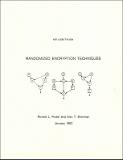| dc.description.abstract | A randomized encryption procedure enciphers a message by randomly choosing a ciphertext from a set of ciphertexts corresponding to the message under the current encryption key. At the cost of increasing the required bandwidth, such procedures may achieve greater cryptographic security than their deterministic counterparts by increasing the apparent size of the message space, eliminating the threat of chosen plaintext attacks, and improving the a priori statistics for the inputs to the encryption algorithms. In this paper we explore various ways of using randomization in encryption. | en_US |
